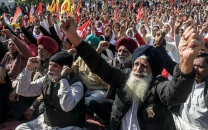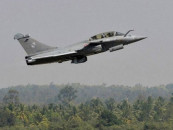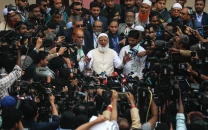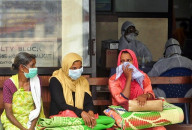Russia, China veto UN Security Council resolution on Syria
It was the third time that Russia and China have used their veto power to block resolutions on Syria.

It was the third time that Russia, a key ally of the Syrian government, and China have used their veto power to block resolutions designed to pressure Syrian President Bashar al-Assad and halt the 16-month conflict that has killed thousands.
With the mandate for a U.N. observer mission in Syria set to expire at midnight Friday (0400 GMT Saturday), Western states that pushed the resolution to renew the operation under a threat of sanctions against Damascus reacted angrily to the vetoes.
"The effect of their actions is to protect a brutal regime. They have chosen to put their national interests ahead of the lives of millions of Syrians," Britain's U.N. ambassador, Mark Lyall Grant, told the 15-member Security Council after the vote.
The U.S. ambassador to the United Nations, Susan Rice, called the Russian and Chinese moves "dangerous and deplorable" and said the Security Council had "failed utterly." French Ambassador Gerard Araud called it a sad day for Syria.
The Security Council was set for another showdown on Friday over new rival resolutions intended to simply extend the mission. Pakistan, with the support of Russia, is proposing a 45-day extension, while Britain has put forward a 30-day extension.
After negotiations late on Thursday, it was unclear if either measure had enough backing to pass - at least nine votes and no vetoes by the United States, Britain, France, Russia or China. The Security Council is scheduled to vote on Friday.
U.N. Secretary-General Ban Ki-moon said he was "deeply disappointed" by the Security Council vote on Thursday. "The hour is grave. The international community has a collective responsibility to the Syrian people," he said in a statement.
International mediator Kofi Annan, who had sought a tough resolution to save his disintegrating peace plan, also voiced disappointment, saying the council had failed to take "the strong and concerted action" he had hoped for.
As diplomatic efforts appeared to collapse, Syrian rebels clashed with forces loyal to Assad in Damascus a day after the killing of three allies of the president led to fresh warnings that the situation was spinning out of control.
The Western-backed resolution, which would have extended a U.N. observer mission in Syria for 45 days, received 11 votes in favor on Thursday, while South Africa and Pakistan abstained.
"We simply cannot accept a document ... that would open the path for the pressure of sanctions and further to external military involvement in Syrian domestic affairs," Russia's U.N. Ambassador Vitaly Churkin told the council.
China's U.N. Ambassador Li Baodong hit out at Western criticism of his country's vote.
"Certain countries in their remarks just now have confused right with wrong, and criticized China for no reason. This is totally wrong and has ulterior motives. The Chinese side is resolutely opposed to this," Li said.
Western council members have said they were talking about a threat of sanctions on Syria, not military intervention. Their resolution had contained a specific threat of sanctions if Syrian authorities did not stop using heavy weapons and withdraw troops from towns and cities within 10 days.
ANOTHER SHOWDOWN
Russia had proposed its own alternative resolution to extend the U.N. mission for three months without the sanctions threat but did not bring that measure to a vote because Churkin said he wanted to avoid further confrontation. Western diplomats said the Russian resolution had little support in the council.
But after the vetoes by Russia and China on Thursday, two new resolutions to simply extend the mission were put forward by Britain and Pakistan, supported by Russia, for a Friday vote.
Lyall Grant said Britain's new resolution would only allow for an extension of the mission beyond the additional 30 days if the Syrian authorities had stopped using heavy weapons and had withdrawn troops from towns and cities - and if the level of violence had decreased enough to allow the mission to work.
Russia's Churkin said the resolution should be a straight-forward rollover of the mission and that he disagreed with the British draft because of its specific reference to the Syrian authorities halting the use of heavy weapons.
"Both drafts are going for a vote tomorrow morning," Churkin told reporters.
Rice said the United States would "probably" support the British resolution and described the Pakistani resolution as a
simple technical rollover. "We have been clear, we are not supporting a technical rollover," she told reporters.
CHEMICAL WEAPONS
Rice told the council after Thursday's vote was vetoed that the United States does not "pin its policy on an unarmed observer mission that is deployed in the midst of such widespread violence and that cannot even count on the most minimal support of this Security Council."
"Instead, we will intensify our work with a diverse range of partners outside the Security Council to bring pressure to bear on the Assad regime and to deliver assistance to those in need," she said.
The United States has been instrumental in forming the "Friends of Syria" group, which includes a range of Western and Arab countries, that has sought to increase pressure on Damascus and encourage more unity among Syria's fractured opposition.
The Security Council initially approved the deployment of the observer mission, known as UNSMIS, to monitor a failed April 12 ceasefire. UNSMIS suspended most of its monitoring activity on June 16 due to increased risk from rising violence.
Rice noted that the escalating violence was sharpening concerns over Syria's undeclared stockpile of chemical weapons, believed to be the largest of its kind in the Middle East.
"As the situation deteriorates, the potential that this regime could consider using chemical weapons against its own people should be a concern for us all," she said.
Syria's Ambassador Bashar Ja'afari maintained Damascus' commitment to Annan's peace plan and said authorities would not use chemical weapons against the Syrian people.
"What has been said of late, in the media, about chemical weapons, the intention of Syria to use chemical weapons, has no basis whatsoever," he told the council.
Despite some limited cooperation with Western powers, Russia and China have been increasingly pro-active in recent years when it comes to preventing Western Security Council members from putting too much pressure on the governments of countries where they have an interest, such as Iran, North Korea and Sudan.
Russia and China support each other on the council to protect their respective allies from interference.



















COMMENTS
Comments are moderated and generally will be posted if they are on-topic and not abusive.
For more information, please see our Comments FAQ